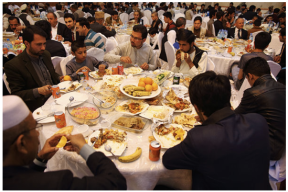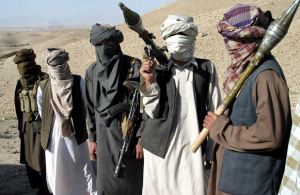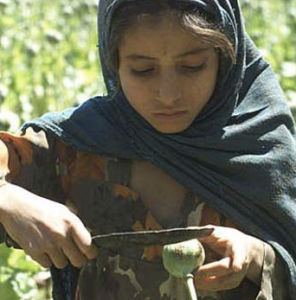The repercussions of the staggeringly high levels of unemployment can be felt throughout all of Afghan society. Many problems in the family structure can be blamed on the lack of jobs capable of provided a stable salary for young men. Women also feel the pressures of high unemployment, yet are often denied the agency to seek employment for themselves. Financial desperation leads to many individuals turning to illicit activities in an attempt to improve their prospects. Though the following sections may be disheartening, it is important to remember that Afghanistan is still recovering from decades of conflict and oppression from the Soviets, the Taliban, and the United States.
Family Relationships
Financial difficulties and unemployment have also been blamed for weakening family units. Without steady incomes, many young men find themselves unable to afford the price of mahr, the traditional dowries paid to a father as compensation for the loss of money his daughter could potentially bring to the family. Young women who possess a marketable skill, such as carpet weaving, are more desirable as wives since their skill can bring in income to their husband’s family. However, marrying such women usually requires that a higher dowry be paid to the bride’s family (Moghadam, 1997).
Furthermore without income, men are also unable to host an extravagant wedding ceremony, which is customary in Afghan culture (Gaan, 2015). It is not uncommon for a wedding ceremony to have 500-700 guests. The guests include extended family, friends, neighbors, and all co-workers. There are increasing instances of toi paal, which are individuals who crash weddings uninvited in order to partake in the free catering. It is not easy for the bride or groom to tell if someone is at their wedding uninvited as it is not uncommon for many of the invited guests to be unknown to them. Young couples who already feel the pressure of the poor economy are forced to carry the burden of paying for hundreds of guests, and however many toi paal, come to their ceremony by cultural expectations. Weddings are not just an event to celebrate love in Afghanistan, but also a way to demonstrate one’s commitment to the community and to hospitality (Goldstein, 2015). Speaking on the necessity of serving all guests, even the uninvited ones, groom Shafiqullah said, “If I didn’t serve them, it would have caused me dishonor and taken away all happiness from my wedding day,” (Goldstein, 2015). In order to accommodate the influx of toi paal, Shafiqullah had the caterers double the food, a cost he and his wife would have to bear. Exuberant wedding costs result in many men either deciding to remain engaged for several years or to put off even looking for a wife until they believe they can afford the cost of the wedding. There is a proverb in Afghanistan, “Qarz ko, zan ko, Qarz merasa, zan memana” which translates to “Borrow money and get married, you’ll eventually pay the debt, however the woman will be at your home.” However, without steady employment young families, many of whom marry before they are twenty years old, start their marriage off in considerable debt which limits their ability to assist in their children’s education or continue their own.
Instances of domestic violence are also damaging the family structure, as men will take their economic frustrations out on their wives and children through beating them. In a 2010 study conducted by Eggerman and Panter-Brick (2010), a sixteen year old Afghan blamed financial concerns with her father’s violent outbursts saying, “my father’s salary is not enough for us, he has takleef asabi [mental disorder] and he beats us… if he finds a decent job then maybe he will calm down (p. 75). Some women, equally upset by their seeming lack of prospects, will beat their children, perpetuating violence in the household. This is especially common in rural areas (Eggerman & Panter-Brick, 2010). Children in Afghanistan were exposed to violence in the streets through out the Taliban and Post-Taliban eras and to violence in the home due to their parents’ outbursts brought on by economic and societal pressures. In such an environment daily violence is normalized and the bonds of the family are weakened. With such a turbulent home life, it can be difficult of students to focus on their education.
Illicit Employment
Out of desperation to provide for their impoverished families or in hopes of improving their own social status through financial means, many Afghan youth will turn to illicit forms of employment, such as radicalized movements or drug trafficking. Though the Taliban is no in control of the country, it still plays an influential role on the people, particularly in rural and very poor areas. Youth with little employment prospects may turn to the Taliban for work. They usually do not join out of any ideological motivation, but rather because the Taliban has the funds to be able to pay its members an allowance, potentially relieving the financial burdens of young Afghan men so that they may save their money, provide for their families, and get married (Gaan, 2015). It is in part due to this continued financial dependency that allows the Taliban to remain active in Afghanistan despite have been usurped by the current government. Recently the Taliban has begun holding what is being called a Ramadan initiative, though it is nothing like the altruistic movements by the similar names. In this instance, it refers to members of the Taliban who will hold public talks approximately two months before Ramadan to any who wish to hear them. The purpose of these talks is to redeem themselves to the Afghan public by using religious texts to justify their violent actions and to recruit young members (Gaan, 2015). With the country in turmoil and so many youth out of work and hope, the Taliban is attempting to position itself in the role of their savior to gain back power in an American absence.
The production, distribution, and smuggling of opium is another lucrative employment option in Afghanistan and by far the most popular. Opium is readily available as Afghanistan’s climate is perfect for growing fields upon fields of opium poppies. The country produces roughly 90% of the world’s total opium supply, necessitating a large labor force to move the product (Lavender, 2011). Afghan youth are employed as growers and distributes of opium. They also work as drug mules, smuggling opium into nearby countries from which it is transported to all over the world. It is estimated that 30% of the total Afghan population is involved in the opium trade in some facility, though exact numbers are difficult given the secretive nature of the drug trade (Gaan, 2015).
Youth in Afghanistan are not only at risk of becoming employees of the drug trade, but also opium users. Due to the availability of opium and its incorporation into the daily lives of many Afghan citizen, Afghanistan has an unusually high percentage of drug users as 8% of the total population uses opium, twice the world average (Lavender, 2011). A further study on the impact of extensive drug use in Afghan populations revealed that 7% of drug users in Afghanistan had HIV, an epidemic that is now spilling over into neighboring countries. Opium addiction can start from childhood as misinformed parents will sometimes give opium to children in an attempt to ease hunger pains or they will use it as a medicine when children become ill without fully realizing the consequences (Gaan, 2015).




